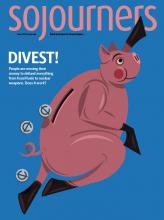AS WE SWING into the 2016 presidential campaign, we Americans can be certain of at least one thing: We will be treated to another round of very public arguments about the role of religion in our republic. If this were a boxing match, and if past patterns persist, the title of the bout would be Christian Nation vs. Secular Country. The sides, more eager to mobilize their own than have a conversation with the other, will happily seek to bludgeon one another.
Thankfully, a number of writers have set out to complicate this picture in a way that adds both color and hope. Peter Manseau’s One Nation, Under Gods and Denise Spellberg’s Thomas Jefferson’s Quran are beautifully written accounts of our interfaith country. By interfaith, I mean both that there were people of different faith persuasions present from our earliest days, and that they constantly bumped into one another as they established their communities and sought to build up this country.
Read the Full Article

